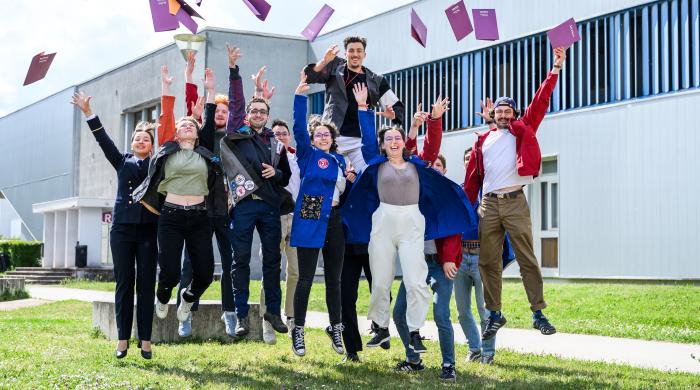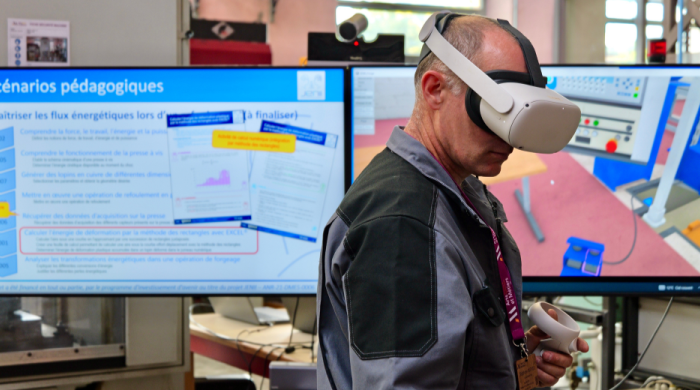
JENII project progress in recent months The latest developments include technological advances, a symposium and new dissemination methods.
A FIRST MAJOR EVENT
JENII successfully kicked off 2023 with a symposium open to the public on 23 March.
It was entitled “Metaverse and digital twins, immersive teaching technologies” and was divided into two parts. The morning was devoted to a project overview, presenting its objectives and two central focuses: educational and technological innovation. The speakers discussed the first 18 months of the project and tested the first demonstrations. Participants were able to use VR headsets to experience immersion in the workshops.
The afternoon was devoted to round-table discussions, launching debate on two topics: inclusion and the use of immersive technologies.
It was an especially insightful discussion in light of the JENII project’s aim: use new technologies to enable everyone to learn remotely.
Use cases for industry were also presented with Stellantis, Safran and Renault, as well as for higher education with Neoma Business School, and with an intensive care physician at UPEC. The full symposium is available on the project’s YouTube channel.
It was also an opportunity to present the first version of the white paper “Teaching with immersive, interactive digital twins,” developed by the project team.
WRITING THE WHITE PAPER
The idea to write a white paper was sparked by an observation: there is a great deal of scientific literature on immersive technology, but very little on its use in education. For example, out of approximately 4,000 articles on digital twins, only around thirty address the topic of learning. This white paper is the first of its kind and will be added to as the project progresses. The first version published on 13 March 2023 is freely available on the RELIAM platform.
A DISSEMINATION STRATEGY IS TAKING SHAPE
In addition to the white paper providing insights on teaching in an immersive environment, JENII is working on techniques for dissemination in high schools, through a test phase in Metz. Cyrille Baudoin, head of the Vulcain platform, has been working with high schools in the region for a long time. The aim is to identify their training needs and connect teachers with the themes developed in the project.
The digital twins themselves may be used to support learning, since they provide a way to visualize invisible concepts and phenomena that are difficult to perceive in a real environment.
The team is working on an introductory module for the community to explain what a digital tool is and how it can be used. A student ambassador programme will also be set up to disseminate the project among the entire Arts et Métiers student community.
Project manager and coordinator Sébastien Fernandez is delighted with the project’s progress and hopes to further develop the educational portion soon: “We’re extremely satisfied with the JENII project’s progress over the past year. We’ve presented our first demonstrations, published our white paper and expanded our presence at various shows. We will continue our commitment, focusing on dissemination in the education community. We look forward to sharing our work and continuing to advance the use of digital twins for learning.”
The eight Arts et Métiers physical platforms
- Cobotics and assembly line platform (Richard Béarée, Lille)
- 4.0 practice platform (Emmanuelle Chavanne, Bordeaux)
- Vulcain platform (Cyrille Baudouin, Metz)
- Energy and fluid system platform (Florent Ravelet, Paris)
- Gravity die casting platform (Julien Artozoul, Angers)
- Low pressure platform (Jérémie Bourgeois, Aix-en-Provence)
- Wood peeling platform (Louis Denaud, Cluny)
- High-performance machining platform (Guillaume Fromentin, Cluny)



